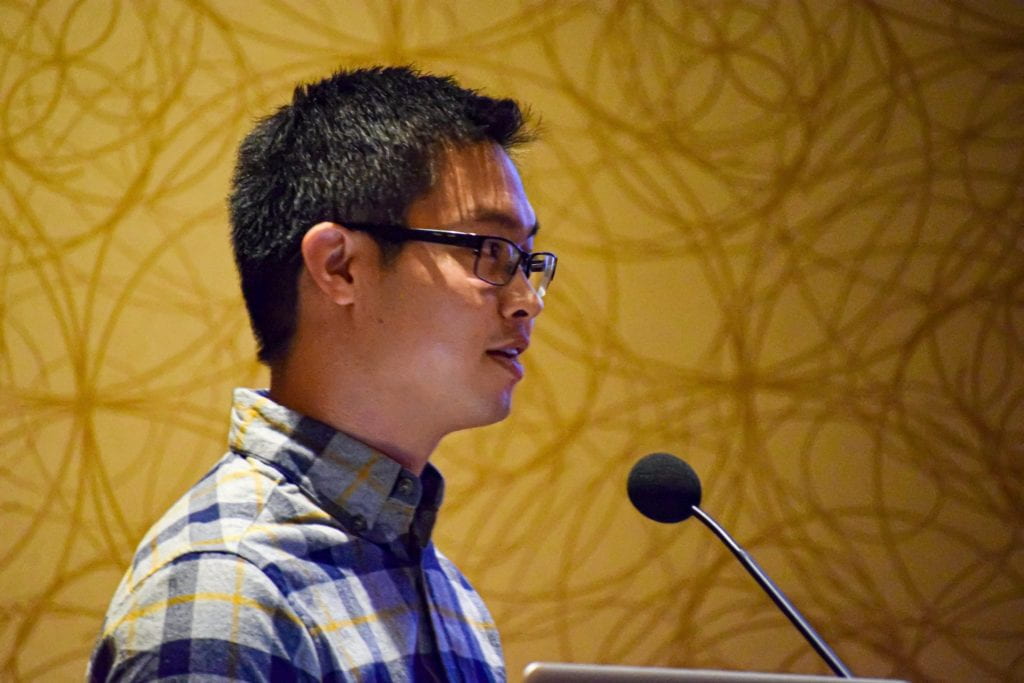Making Your Science Uniquely You: A Perspective on Presentations from Mr. Takahiro Ohara
Interviewed by Mandy Chan
Written by Eryn E. Dixon
We all have to do it….the dreaded scientific presentation. They come in all shapes and sizes from quick abstract talks to one-hour lectures. But, for many of us, they bring substantial loads of stress and anxiety. There is something vulnerable about standing alone in front of a crowd with just a computer screen and laser pointer. “Will my talk make sense?” you may ask. “What if I can’t answer each question?” “Will I forget what I am supposed to say?”
Despite our best efforts, we cannot escape the dreaded oral presentation; they are here to stay and only increase in frequency with career progression. So, how can one approach and master these anxiety-filled “opportunities”? The simple answer….meet your insecurities with preparation. At least, that is the lesson we learned in our conversation with Mr. Takahiro Ohara, the winner of the iBiology Share Your Research (SYR) Competition in 2021; a new opportunity from iBiology for early career scientists to develop tools for effective science communication.
iBiology is a platform for open access videos that defines the scientific process, provides insights from real life scientists about topics in research and career development, as well as breaks down complex molecular biology processes.
Mr. Takahiro Ohara, who goes by Taka, is an MD-PhD student in the Department of Pathology and Immunology at Washington University in St. Louis and recently defended his thesis, titled “Dynamics of epithelial differentiation following intestinal villus injury.” His interest in tissue regeneration stems from his father’s diagnosis with an untreatable retinal degenerative disease. With his father as his inspiration, Taka has cultivated an exemplary track record of research experience in support of understanding how stem cells could lead to potential therapies for degenerative diseases. He hopes that his dedication and work ethic will carry him to his ultimate goal of becoming a physician-scientist, pushing the boundaries of regenerative medicine to treat diseased organs. Though Taka’s research has been successful, he realized early in his training that despite his enthusiasm for science, he would be stifled if he didn’t address one major weakness….public speaking.
Early on in his education journey, Taka loathed the idea of public speaking. He recounted one such story of telling a joke as an assignment for his college communications class, only to be met by dead silence from the audience. Plagued as many of us are by stage fright, Taka made the decision to attack his fears head on by pushing himself to sign up for leadership positions and even volunteering to teach the medical school histology course. He made many (often embarrassing) mistakes, learned from them, and ultimately discovered what speaking styles worked for him. Through these learning experiences, he quickly realized that the best way to mitigate his presentation insecurities was through audience engagement — in other words, taking into consideration the background and interests of the audience and tailoring his talk to them. This initiative got his head out of his notes, strengthened his scientific knowledge, and empowered him to speak comfortably on stage.
Through countless poster presentations, lab meetings, and seminar presentations during his PhD training, Taka has developed and optimized a story-telling strategy for clear and engaging scientific presentations. To do this, he clearly states his main message and then crafts the introduction, body, and conclusion of his talk around that message. This was also one of the biggest lessons Taka learned in the two-week science communication workshop he took following his selection as a finalist of iBiology SYR 2021. He says, “An audience for a presentation is a moving target and learning to distill your message to its core will help you adapt for each individual encounter.” We look forward to watching and sharing Taka’s final video presentation when it becomes live in the near future.
Everyone’s strategy for attacking scientific presentations is a little different. Taka summarizes his three main talking tips below:
- Make it fun: “If it is fun for you, the audience can sense that energy and it will be fun for them as well.”
- Cover all the basics: “There is a formula for giving effective science talks: introduction, a central question, simple and relevant data slides, a summary, and future directions.”
- Be YOURSELF: “Be uniquely you. No one can [tell your story] better than you and your presentation is your opportunity to do it.”
Team laser point or Team animation: “Definitely team animation, but not against laser pointers.”
Do you struggle with presentation anxiety like Taka did? If so, we can help here at InPrint with our new Presentation Consulting Service. Whether you want a fresh set of eyes and ears or need practice telling your story, submit your work to InPrint and let our consultants help you conquer your presentation to tell your science story in a way that is “uniquely you”!
